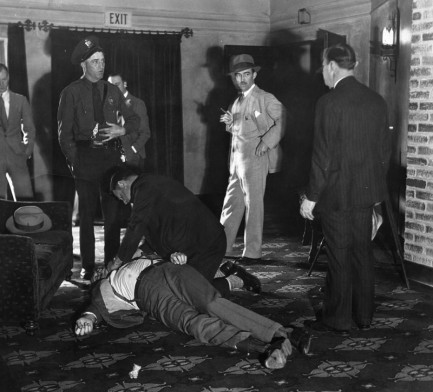| The Naked City | Jan 12 2024 |


Police Lt. Hugh Crowley lies dead in the Fox Westwood Village Theater in Los Angeles after being shot today in 1932. Crowley had gone to the theater after closing time to retrieve box office receipts, but instead surprised two thieves. Crowley reached for his sidearm and fired, and one of the crooks gunned him down. Both men were captured and tried, and Joseph Francis Regan, who had fired the fatal shot and actually been hit in the abdomen by a bullet fired by Crowley, was sentenced to death. Jack Green, who had no prior criminal record, had not fired a shot, and had cooperated in the police investigation, nevertheless also was sentenced to death, probably because he had planned the crime. Regan was hanged at San Quentin State Prison in August 1933. Green came close to the gallows, but received numerous reprieves after public pleas for leniency from his parents, and rulings from higher courts. Eventually his sentence was commuted to life in prison.
Although Green was probably never aware of it, legal authorities often cited his case during the long battle over the constitutionality of the death penalty in California. The idea put forth by the pro-death penalty side around 1960 was that even though Green’s commuted sentence specified “without possibility of parole,” there was no actual reason in California jurisprudence or the state constitution that he could not be released. All that was required was for an appropriate state authority to decide to do it. They felt therefore that anti-death penalty campaigners’ assurances that criminals could be imprisoned for life if such punishment was deemed necessary meant nothing. No matter the language of the original life sentence, any criminal could later be released. Green doubtless would have found all this fascinating, but none of it ever came to affect him. As far as we can tell, he did in fact spend the rest of his life in San Quentin.




































































